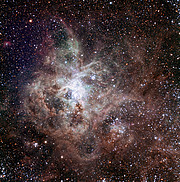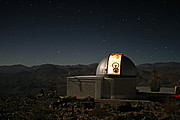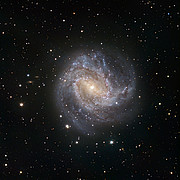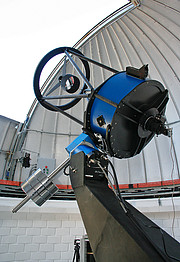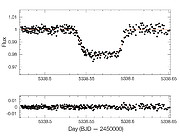Komunikat prasowy
Nowy narodowy teleskop w La Silla
TRAPPIST do przeszukiwania nieba oraz odkrywania egzoplanet i komet
8 czerwca 2010
Nowy automatyczny teleskop uzyskał pierwsze światło w Obserwatorium ESO La Silla w Chile. TRAPPIST (TRAnsiting Planets and PlanetesImals Small Telescope) jest przeznaczony do badania układów planetarnych za pomocą dwóch podejść: wykrywania i uzyskiwania charakterystyk planet położonych poza Układem Słonecznym (egzoplanet) oraz badania komet krążących wokół Słońca. 60-centymetrowy teleskop jest sterowany z Liège w Belgii, z odległości 12 000 km.
“Dwa tematy projektu TRAPPIST są ważnymi częściami rosnącego pola badań interdyscyplinarnych – astrobiologii – która skupia się na badaniu pochodzenia i rozmieszczenia życia we Wszechświecie”, wyjaśnia Michaël Gillon, który kieruje badaniami planet pozasłonecznych.
“Planety typu ziemskiego, podobne do naszej Ziemi, są oczywistymi celami dla poszukiwania życia poza Układem Słonecznym, podczas gdy komety są podejrzewane o odegranie ważnej roli w pojawieniu i rozwinięciu się życia na naszej planecie”, dodaje jego kolega Emmanuël Jehin, który zarządza kometarną częścią projektu.
TRAPPIST będzie odkrywał i charakteryzował planety pozasłoneczne poprzez wykonywanie precyzyjnych pomiarów spadków jasności, które mogą być powodowane przez tranzyty egzoplanet. Podczas takiego tranzytu obserwowana jasność gwiazdy nieznacznie spada, ponieważ planeta blokuje część światła. Im większa planeta, tym więcej światła jest blokowane i tym większy spadek jasności gwiazdy. [1].
“Obserwatorium ESO La Silla na obrzeżach pustyni Atakama jest z pewnością jedną z najlepszych astronomicznych lokalizacji na świecie” mówi Gillon. „A ponieważ jest już domem dla dwóch świetnych łowców egzoplanet, nie moglibyśmy znaleźć lepszego miejsca do zainstalowania naszego automatycznego teleskopu.”
Astronomowie stojący za inicjatywą TRAPPIST będą bardzo blisko współpracować z zespołem używającym spektrografu HARPs na 3,6-metrowym teleskopie i CORALIE zamontowanego na szwajcarskim 1,2-metrowym Teleskopie Leonharda Eulera, oba w La Silla. TRAPPIST jest efektem współpracy pomiędzy Uniwersytetem w Liège (Belgia), a Obserwatorium Genewskim w Szwajcarii. Teleskop został zainstalowany w budynku, który mieścił kiedyś stary szwajcarski teleskop T70. Dzięki tej współpracy cały projekt szybko się rozwija, zaledwie dwa lata minęły od decyzji o budowie do uzyskania pierwszego światła.
TRAPPIST będzie także używany do badania komet na niebie południowym. W tym celu teleskop został wyposażony w specjalne duże, dobrej jakości filtry kometarne, pozwalające astronomom na regularne i szczegółowe badania różnych typów molekuł wyrzucanych przez komety podczas ich drogi dookoła Słońca.
“Z dziesiątkami komet obserwowanych każdego roku dostarczy nam unikalnego zestawu danych, przynosząc ważne informacje o ich naturze”, mówi Jehin.
TRAPPIST to lekki 0.6-metrowy teleskop, w pełni zautomatyzowany i śledzący precyzyjnie na niebie z dużą prędkością. Program obserwacyjny jest przygotowywany z wyprzedzeniem, a teleskop może wykonywać całonocne obserwacji bez nadzoru. Stacja meteorologiczna przez cały czas monitoruje pogodę i decyduje o zamknięciu kopuły, gdy zachodzi taka konieczność.
Uwagi
[1] Tranzyt planetarny występuje gdy ciało przechodzi przed swoją gwiazdą i blokuje część jej światła. Ten rodzaj zaćmienia powoduje zmiany w widocznej jasności gwiazdy i umożliwia zmierzenie średnicy planety. W połączeniu z pomiarami prędkości radialnych możliwe jest także wyznaczenie masy, a w konsekwencji również gęstości planety.
Więcej informacji
TRAPPIST (TRAnsiting Planets and PlanetesImals Small Telescope) jest projektem prowadzonym przez Wydział Astrofizyki, Geofizyki i Oceanografii Uniwersytetu w Liège (Belgia), w bliskiej współpracy z Obserwatorium Genewskim (Szwajcaria). TRAPPIST jest finansowany głównie przez Belgijski Fundusz Badań Naukowych (FNRS - Belgian Fund for Scientific Research) z udziałem Szwajcarskiej Narodowej Fundacji Nauki (SNF - Swiss National Science Foundation).
W skład zespołu wchodzą: Emmanuël Jehin, Michaël Gillon, Pierre Magain, Virginie Chantry, Jean Manfroid i Damien Hutsemékers (Uniwersytet w Liège, Belgia) oraz Didier Queloz i Stéphane Udry (Obserwatorium Genewskie, Szwajcaria).
Nazwa TRAPPIST została nadana teleskopowi, aby podkreślić belgijskie pochodzenie projektu. Piwa typu Trappist są słynne na całym świecie, a większość z nich jest belgijska. Co więcej, członkowie zespołu badawczego uwielbiają je!
Linki
Kontakt
Emmanuël Jehin
University of Liège
Liège, Belgium
Tel.: +32 4 366 97 26
E-mail: ejehin@ulg.ac.be
Didier Queloz
Geneva Observatory, University of Geneva
Geneva, Switzerland
Tel.: +41 22 379 2477
E-mail: didier.queloz@unige.ch
Henri Boffin
ESO, La Silla Paranal and E-ELT Press Officer
Garching, Germany
Tel.: +49 89 3200 6222
Tel. kom.: +49 174 515 43 24
E-mail: hboffin@eso.org
Michaël Gillon
University of Liège
Liège, Belgium
Tel.: +32 4 366 97 43
E-mail: michael.gillon@ulg.ac.be
Pierre Magain
University of Liège
Liège, Belgium
Tel.: +32 4 366 97 43
E-mail: pierre.magain@ulg.ac.be
Krzysztof Czart (Kontakt dla mediów Polska)
Sieć Popularyzacji Nauki ESO
oraz Urania - Postępy Astronomii
Toruń, Polska
Tel.: +48 513 733 282
E-mail: eson-poland@eso.org
O komunikacie
| Komunikat nr: | eso1023pl |
| Nazwa: | 30 Doradus, NGC 2070, Tarantula Nebula |
| Typ: | Local Universe : Nebula : Appearance : Emission : H II Region |
| Facility: | TRAnsiting Planets and PlanetesImals Small Telescope–South |
Our use of Cookies
We use cookies that are essential for accessing our websites and using our services. We also use cookies to analyse, measure and improve our websites’ performance, to enable content sharing via social media and to display media content hosted on third-party platforms.
ESO Cookies Policy
The European Organisation for Astronomical Research in the Southern Hemisphere (ESO) is the pre-eminent intergovernmental science and technology organisation in astronomy. It carries out an ambitious programme focused on the design, construction and operation of powerful ground-based observing facilities for astronomy.
This Cookies Policy is intended to provide clarity by outlining the cookies used on the ESO public websites, their functions, the options you have for controlling them, and the ways you can contact us for additional details.
What are cookies?
Cookies are small pieces of data stored on your device by websites you visit. They serve various purposes, such as remembering login credentials and preferences and enhance your browsing experience.
Categories of cookies we use
Essential cookies (always active): These cookies are strictly necessary for the proper functioning of our website. Without these cookies, the website cannot operate correctly, and certain services, such as logging in or accessing secure areas, may not be available; because they are essential for the website’s operation, they cannot be disabled.
Functional Cookies: These cookies enhance your browsing experience by enabling additional features and personalization, such as remembering your preferences and settings. While not strictly necessary for the website to function, they improve usability and convenience; these cookies are only placed if you provide your consent.
Analytics cookies: These cookies collect information about how visitors interact with our website, such as which pages are visited most often and how users navigate the site. This data helps us improve website performance, optimize content, and enhance the user experience; these cookies are only placed if you provide your consent. We use the following analytics cookies.
Matomo Cookies:
This website uses Matomo (formerly Piwik), an open source software which enables the statistical analysis of website visits. Matomo uses cookies (text files) which are saved on your computer and which allow us to analyze how you use our website. The website user information generated by the cookies will only be saved on the servers of our IT Department. We use this information to analyze www.eso.org visits and to prepare reports on website activities. These data will not be disclosed to third parties.
On behalf of ESO, Matomo will use this information for the purpose of evaluating your use of the website, compiling reports on website activity and providing other services relating to website activity and internet usage.
Matomo cookies settings:
Additional Third-party cookies on ESO websites: some of our pages display content from external providers, e.g. YouTube.
Such third-party services are outside of ESO control and may, at any time, change their terms of service, use of cookies, etc.
YouTube: Some videos on the ESO website are embedded from ESO’s official YouTube channel. We have enabled YouTube’s privacy-enhanced mode, meaning that no cookies are set unless the user actively clicks on the video to play it. Additionally, in this mode, YouTube does not store any personally identifiable cookie data for embedded video playbacks. For more details, please refer to YouTube’s embedding videos information page.
Cookies can also be classified based on the following elements.
Regarding the domain, there are:
- First-party cookies, set by the website you are currently visiting. They are stored by the same domain that you are browsing and are used to enhance your experience on that site;
- Third-party cookies, set by a domain other than the one you are currently visiting.
As for their duration, cookies can be:
- Browser-session cookies, which are deleted when the user closes the browser;
- Stored cookies, which stay on the user's device for a predetermined period of time.
How to manage cookies
Cookie settings: You can modify your cookie choices for the ESO webpages at any time by clicking on the link Cookie settings at the bottom of any page.
In your browser: If you wish to delete cookies or instruct your browser to delete or block cookies by default, please visit the help pages of your browser:
Please be aware that if you delete or decline cookies, certain functionalities of our website may be not be available and your browsing experience may be affected.
You can set most browsers to prevent any cookies being placed on your device, but you may then have to manually adjust some preferences every time you visit a site/page. And some services and functionalities may not work properly at all (e.g. profile logging-in, shop check out).
Updates to the ESO Cookies Policy
The ESO Cookies Policy may be subject to future updates, which will be made available on this page.
Additional information
For any queries related to cookies, please contact: pdprATesoDOTorg.
As ESO public webpages are managed by our Department of Communication, your questions will be dealt with the support of the said Department.

